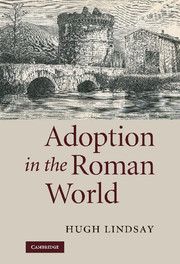Book contents
- Frontmatter
- Contents
- List of figures
- Preface
- List of abbreviations
- Introduction
- 1 Adoption, kinship and the family: cross-cultural perspectives
- 2 Kinship in Greece and Rome
- 3 Greek adoptions: comparisons and possible influences on the Roman world
- 4 Procedural aspects of Roman adoption
- 5 The testamentary adoption
- 6 Roman nomenclature after adoption
- 7 Adoption and inheritance
- 8 Roman freedmen and their families: the use of adoption
- 9 Adoption in Plautus and Terence
- 10 Sallust and the adoption of Jugurtha
- 11 Adrogatio and adoptio from Republic to Empire
- 12 Testamentary adoptions – a review of some known cases
- 13 Political adoptions in the Republic
- 14 Clodius and his adoption
- 15 The adoption of Octavian
- 16 Political adoption in the early Empire at Rome, Pompeii and Ostia; the imperial family
- Conclusion
- Glossary
- References
- Index
2 - Kinship in Greece and Rome
Published online by Cambridge University Press: 25 January 2010
- Frontmatter
- Contents
- List of figures
- Preface
- List of abbreviations
- Introduction
- 1 Adoption, kinship and the family: cross-cultural perspectives
- 2 Kinship in Greece and Rome
- 3 Greek adoptions: comparisons and possible influences on the Roman world
- 4 Procedural aspects of Roman adoption
- 5 The testamentary adoption
- 6 Roman nomenclature after adoption
- 7 Adoption and inheritance
- 8 Roman freedmen and their families: the use of adoption
- 9 Adoption in Plautus and Terence
- 10 Sallust and the adoption of Jugurtha
- 11 Adrogatio and adoptio from Republic to Empire
- 12 Testamentary adoptions – a review of some known cases
- 13 Political adoptions in the Republic
- 14 Clodius and his adoption
- 15 The adoption of Octavian
- 16 Political adoption in the early Empire at Rome, Pompeii and Ostia; the imperial family
- Conclusion
- Glossary
- References
- Index
Summary
In the nineteenth century, as the discipline of anthropology developed, kinship was seen as a key to understanding the working of social systems. Pioneers of that field suggested that societies without highly evolved political and individual roles defined their social relations with respect to kinship. Those involved were legally trained in the Classical tradition; they could see in Roman law attempts at defining a wide range of familial relationships and obligations, and they saw Rome as an important evolutionary phase in a more sophisticated social setting, removed from the primitive. Even today kinship is seen as more important in simple societies, whereas complex societies have evolved away from it (Trautmann [1987] 180). The result has been that in modern studies of kinship there is still much recourse to terminology from Roman law, which had provided the seed bed for the analysis of family in terms of kin relationships. It also raises the question of whether kinship beyond the household did have a deep impact in the ancient world.
Family relationships in both Greece and Rome have been subjected to considerable scrutiny over the past forty years; today after much detailed investigation of male and female power in both contexts it appears that the two cultures were less alike than was first thought. Sarah Pomeroy, in her study of Families in Classical and Hellenistic Greece (1997), warns of the dangers of approaches which try to pin down a unified European identity and exaggerate similarities between communities which clearly developed separately and to some degree in isolation.
- Type
- Chapter
- Information
- Adoption in the Roman World , pp. 29 - 34Publisher: Cambridge University PressPrint publication year: 2009

